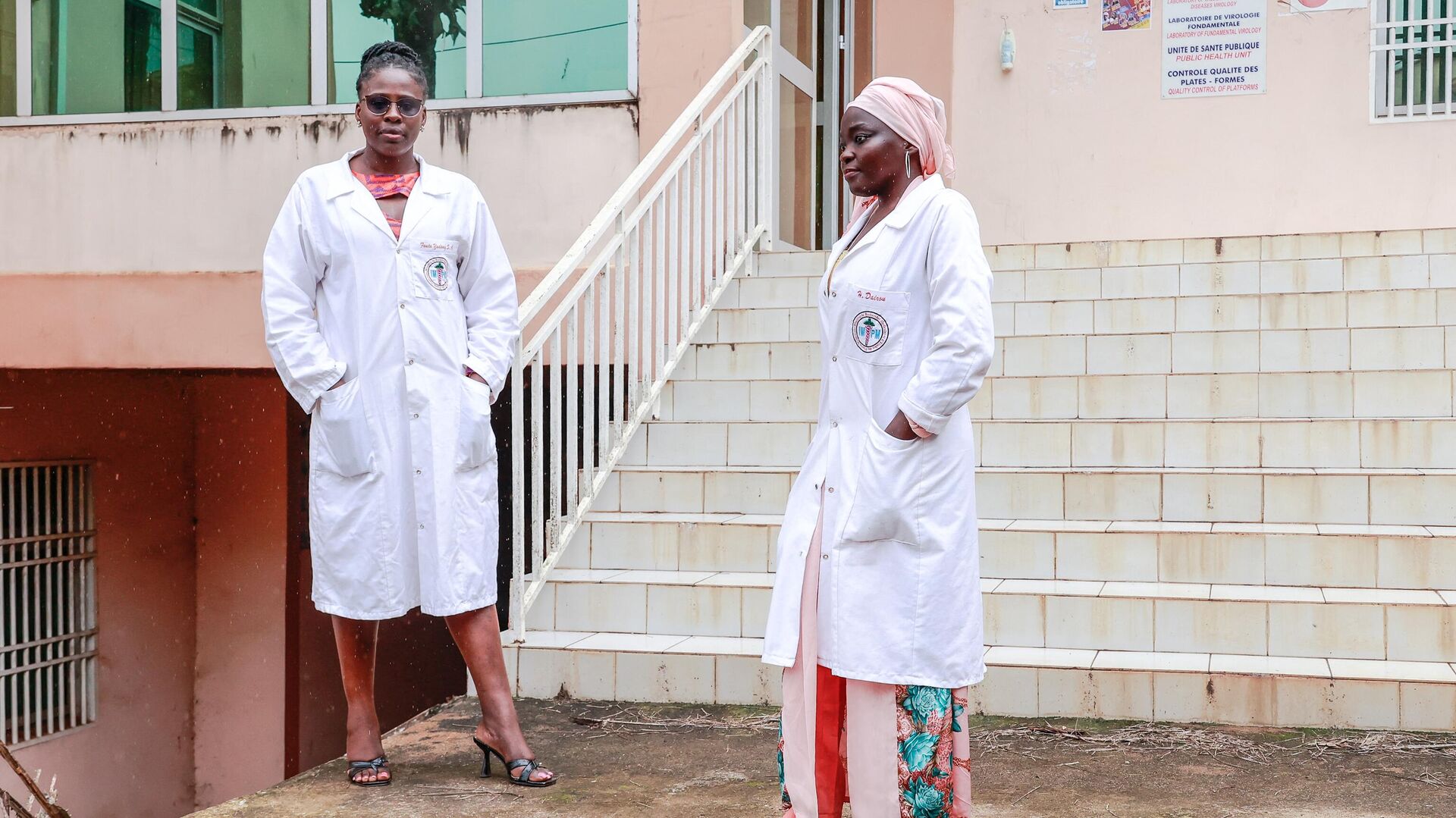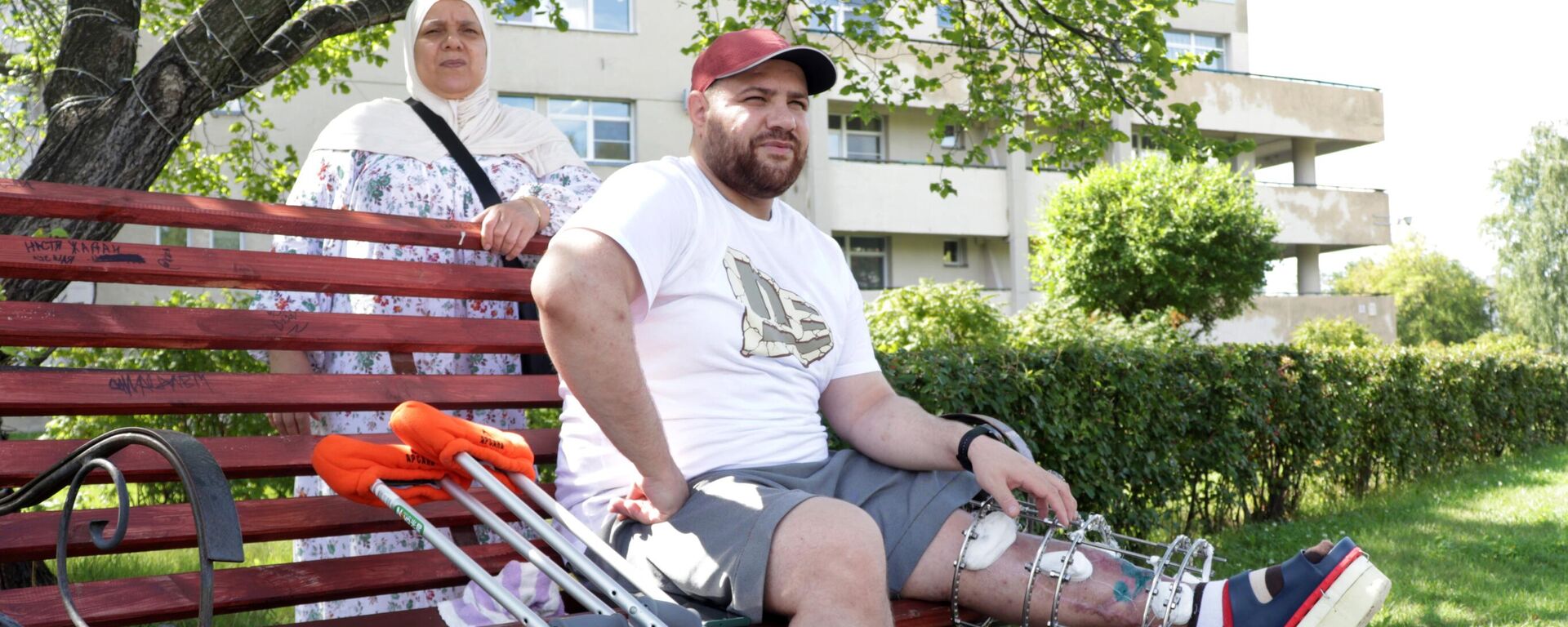https://en.sputniknews.africa/20240211/science-needs-women-cameroonian-female-researchers-reflect-on-day-of-women-and-girls-in-science-1065027519.html
'Science Needs Women': Cameroonian Female Researchers Reflect on Day of Women and Girls in Science
'Science Needs Women': Cameroonian Female Researchers Reflect on Day of Women and Girls in Science
Sputnik Africa
In 2016, the United Nations declared February 11 the International Day of Women and Girls in Science. The main goal of the day is to encourage more girls and... 11.02.2024, Sputnik Africa
2024-02-11T16:18+0100
2024-02-11T16:18+0100
2024-02-11T17:00+0100
opinion
cameroon
west africa
health
healthcare
science
women
united nations (un)
africa in details
https://cdn1.img.sputniknews.africa/img/07e8/02/0b/1065027721_0:161:3071:1888_1920x0_80_0_0_4e0a347a68a427a922697bbf81f00d02.jpg
In honor of the International Day of Women and Girls in Science, Sputnik Africa reached out to female scientists from Cameroon, who received the award for contributions to medicine, to discuss their childhood influences, career trajectories, and the challenges women face in the scientific community.Fanta Yadang and Hadidjatou Daïrou are researchers at the Cameroon Institute of Medical Research. Both women are recipients of L'Oréal-UNESCO For Women in Science Young Talent - Sub-Saharan Africa 2023 for their contribution to medicine.Reflecting on their childhoods, both Yadang and Daïrou cited family influences as pivotal in sparking their interest in science. Yadang, inspired by her father's work as a nurse, expressed early curiosity about medicine, while Daïrou's fascination with biological sciences stemmed from her father's profession as a veterinarian.A scientific interest brought the women to the university in 2009, where they met and became friends, had the same mentors, and learned about medicinal plants during their master's program, a journey that ultimately led to their groundbreaking research, bringing the awards.Yadang's focus on Alzheimer's disease led her to study the cognitive benefits of the Carissa Edulis plant.Daïrou, in turn, explored the cardiovascular properties of a local plant's stem bark.The women said that they were motivated to scientific discoveries by their institute, country, and family.Discussing the role of women in science, Yadang and Daïrou emphasized the importance of overcoming gender stereotypes and biases. They highlighted the challenges faced by women, including societal expectations regarding family responsibilities.Despite the obstacles, the scientists underscored the need for women to persevere and contribute their unique perspectives to scientific endeavors.Reflecting on her experiences, Yadang shared, "Women scientists are really important in science fields because we can come with a different way of thinking and doing science. We can bring creativity. That's really important also in science; we are really open-minded and can think beyond what other people can think."
https://en.sputniknews.africa/20240207/it-was-a-miracle-algerian-escapes-amputation-thanks-to-russian-doctors-1064966100.html
cameroon
west africa
Sputnik Africa
feedback@sputniknews.com
+74956456601
MIA „Rossiya Segodnya“
2024
Maxim Grishenkin
https://cdn1.img.sputniknews.africa/img/07e7/0a/17/1063018107_0:0:1104:1103_100x100_80_0_0_03090c85a11f5d2e8a19cf1d989443c9.jpg
Maxim Grishenkin
https://cdn1.img.sputniknews.africa/img/07e7/0a/17/1063018107_0:0:1104:1103_100x100_80_0_0_03090c85a11f5d2e8a19cf1d989443c9.jpg
News
en_EN
Sputnik Africa
feedback@sputniknews.com
+74956456601
MIA „Rossiya Segodnya“
Sputnik Africa
feedback@sputniknews.com
+74956456601
MIA „Rossiya Segodnya“
Maxim Grishenkin
https://cdn1.img.sputniknews.africa/img/07e7/0a/17/1063018107_0:0:1104:1103_100x100_80_0_0_03090c85a11f5d2e8a19cf1d989443c9.jpg
cameroon, west africa, health, healthcare, science, women, united nations (un), africa in details
cameroon, west africa, health, healthcare, science, women, united nations (un), africa in details
'Science Needs Women': Cameroonian Female Researchers Reflect on Day of Women and Girls in Science
16:18 11.02.2024 (Updated: 17:00 11.02.2024) Longread
In 2016, the United Nations declared February 11 the International Day of Women and Girls in Science. The main goal of the day is to encourage more girls and women to work in science and technology, mathematics and engineering, and to break gender stereotypes.
In honor of the International Day of Women and Girls in Science,
Sputnik Africa reached out to female scientists from Cameroon, who received the award for contributions to
medicine, to discuss their childhood influences, career trajectories, and the challenges women face in the scientific community.
Fanta Yadang and Hadidjatou Daïrou are researchers at the Cameroon Institute of Medical Research. Both women are recipients of L'Oréal-UNESCO For Women in Science Young Talent - Sub-Saharan Africa 2023 for their contribution to medicine.
Reflecting on their childhoods, both Yadang and Daïrou cited family influences as pivotal in sparking their interest in science. Yadang, inspired by her father's work as a nurse, expressed early curiosity about medicine, while Daïrou's fascination with biological sciences stemmed from her father's profession as a veterinarian.
"My father was a nurse, so I was quickly introduced to science with my father, as he is working in a medical hospital. I was wondering how he can work in hospital and how he can cure people?" Yadang told Sputnik Africa.
A scientific interest brought the women to the university in 2009, where they met and became friends, had the same mentors, and learned about medicinal plants during their master's program, a journey that ultimately led to their groundbreaking research, bringing the awards.
Yadang's focus on Alzheimer's
disease led her to study the cognitive benefits of the Carissa Edulis plant.
"We know that during Alzheimer's disease there are a lot of pathological hallmarks like memory impairment, oxidative stress, like neuroinflammation. I found that this plant [Carissa Edulis] has the potential first to reduce the memory impairments," she explained.
Daïrou, in turn, explored the cardiovascular properties of a local plant's stem bark.
"So for me, I used the stem bark of a plant that we use here in Cameroon, and then I tried to find the properties of these plants on the lipid accumulation in arteries. What I discovered is that the lipid accumulation is inhibited by the plants and also the chronic inflammation we can find in arteries," Daïrou shared.
The women said that they were motivated to scientific discoveries by their institute, country, and family.
Discussing the role of women in science, Yadang and Daïrou emphasized the importance of overcoming gender stereotypes and biases. They highlighted the challenges faced by women, including societal expectations regarding family responsibilities.
"The first challenge, I think is being a woman first. Being a woman, because, especially here in Africa and also in Cameroon, many people are saying that women belong to the kitchen and there is no place for them in science but [the mindset] is actually changing," Yadang said, adding that harassment against women happens in the workplace. "So it's quite a bit difficult for us to really grow up in scientific field."
Despite the obstacles, the scientists underscored the need for women to persevere and contribute their unique perspectives to
scientific endeavors.
Reflecting on her experiences, Yadang shared, "Women scientists are really important in science fields because we can come with a different way of thinking and doing science. We can bring creativity. That's really important also in science; we are really open-minded and can think beyond what other people can think."
"Science needs women because we can bring up new things in science. We can have good ideas also. We can think about a million things at the same time, and we can also think about one thing. So it's a very big difference. We can have a different way to think, execute our things, and lead. Women are good leaders in science," Daïrou added.



